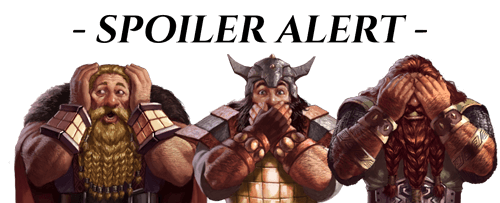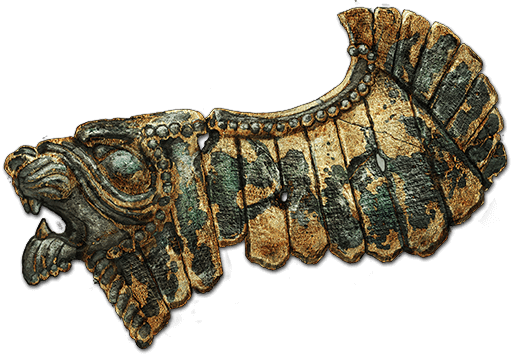
Shelby Chartrand, Augstat, Hesse
The kingdom of Ta Shemau cracked down on gravers this week after two high profile tombs were robbed in Yamu. In overnight activities, the Ta Shemau military—in conjunction with support from the church of Set and legionnaires from the 8th Legion, 2nd Cohort—raided the Graver Guild chapter house in Orbos as well as a series of known graver taverns and conclaves around the city. Individuals assumed to be gravers were seized and detained for questioning.
Authorities arrived with prepared arrest warrants targeting crimes ranging from petty misdemeanors to capital offenses, murder, and even treason. Constables dispensed the warrants liberally, according to witnesses. In makeshift detention centers, gravers were organized into groups based on talents and capabilities: archers, warriors, spell casters, and a variety of additional skills. Any presumed tools of the trade found on an individual were examined, inventoried, and, if deemed a weapon of mass destruction, permanently confiscated.
Legal postings and town criers were dispersed throughout the city and rural districts and into outlying municipalities and townships all across Ta Shemau, issuing declarations of the strict new laws, which went into effect immediately.
“Gravers are too powerful,” said a senior state official while standing next to the Obelisk of Law on the steps of the chancellery in Orbos. “Most are better equipped than the Legion. But they are as bold as they are stupid, engaging in risky behavior, plaguing their bodies with Marn enhancements, and trading in dangerous weapons. Common folk have no awareness of the lethal weapons parading through our streets. If they knew, there would be an immediate outcry for the government to act.”
Most children are raised on the cautionary tale “The Graver and the Magic Fimbit” about the consequences of unchecked power of magically enhanced weapons. The citywide question has become whether what’s taking place at the moment is a reaction to that sort of tale or if something more subtle and subversive is imminent.
“‘Graver’ is just another word for criminal,” the official continued, his passion fueled by the growing crowd. “Never forget ‘graver’ is a nickname for ‘grave robber,’ and it’s a high crime to be a grave robber in this kingdom.”
At one of three detention centers located around the city, we spoke to detainees as they were being released from custody regarding what was happening within the center’s walls.
“The Church of Set is just pissed off and lashing out, “said Pugnacious Doyle, leaving the detention facility both tired and frustrated. Of his impounded gear, he was left with a small shield and a leather breastplate. “Just bad luck, really, being here when the emperor died.”
Pug Doyle and his graver companions were traveling from the Carmina Shelf and had stopped off in Orbos for a few days before intending to push on to Chelicerae, where they hoped to hunt spiders and harvest spider silk.
“My partner is in prison somewhere, and they won’t tell me why,” he added. “I was fined every red cent I had for carrying poison, and they confiscated my sword, dagger, and crossbow.”
He shrugged off his losses by noting, “At least I’m free.”
Rumors have begun to spread, some suggesting the action against the gravers is actually related to the emperor’s assassination while others support the claims of authorities that it’s only an effort to purge the kingdom of dangerous criminals, like those who robbed the tombs in Yamu.
“Do devils have horns? Of course,” Pug Doyle said. “This pissant desert kingdom would never have had the balls to round up gravers like common criminals when the emperor was alive.”
Back at the chancellery, the official continued to ramp up the rhetoric to a fevered pitch as the crowd swelled.
“Kordaava was a demigod, the most powerful force in the world. He alone beat back the Dark Times and united the world kingdoms into a mighty empire. Whether, devil, demon, or dragon serpent, the world trembled before his might.”
From the crowd, someone shouted, “You left out the part about the emperor being a graver.” This prompted nervous chuckles from a few.
The official changed tactics. “Speaking of gravers, we all know that only another graver, or perhaps a party of gravers, could match the power of Set that would be required to assassinate Kordaava.”
“So, gravers are responsible for killing the emperor?” A lone woman in the crowd pushed forward. “Is that the official government stance?”
“What difference does it make?” the official demanded, clearly frustrated by being repeatedly interrupted. “The emperor is dead nonetheless, and who do you think kept gravers in check? Local magistrates, knight orders, the legion?”
The official waited for a response from the crowd but received none, which seemed to encourage him to continue. “No, it was Marcosta Kordaava, divine emperor of the world. Gravers and their ilk knew that if they got out of line, pushed their luck, killed nobles or maybe a sovereign patesi or konig, or made to intimidate and embroil a kingdom in revolution, Emperor Kordaava would be there to stop them. This is why we need to know who is operating in our kingdoms. There could be twelve future Marcosta Kordaavas drinking ale across the street at this very moment, and we’d never know it.”
The woman in the crowd was not satisfied with this tact. “And that would by bad, why? She demanded. “You said it yourself: Emperor Kordaava united the world.”
Faced with questions he wasn’t prepared to address, the official retired into the chancellery to a barrage or catcalls and boos from the agitated crowd.
In the Dark Times, Chaldea was a cesspool of monsters, and it was gravers, like Emperor Kordaava that kept people safe and alive.
Some say gravers are vital and necessary in current social structure—by placing their lives in jeopardy, they stamp out monsters and other evil-vile things that feed on the edges of society. Further, scholars have long argued that gravers and their weapons may well be the reason why civilization exists at all. In the time of the Claw Hammer War, Chaldea was thick with horrors that made it the very heart of darkness, the antithesis of civilized lands. We should not forget that in the Dark Times, Chaldea was a cesspool, and it was gravers, like Emperor Kordaava, who kept people safe and alive. It was Kordaava who stood against evil so that civilization might flourish, and the forty years of peace and prosperity served as an unheralded triumph throughout the annals of history. And who achieved all of this? A graver.
Experts frequently warn us against deceiving ourselves as to the nature of ongoing evil. The dark horrors Kordaava fought and kept at bay are still out there, they remind us. Emperor Kordaava with his century of drasildar kept them in check or locked up (witness Ebercorum in Perrin, the legendary city of the dead). And now, they caution, this is the very thing Ta Shemau intends to do to gravers.
“There is no evidence gravers were involved in the robberies in Yamu or in Emperor Kordaava’s assassination,” said an anonymous officer in the 8th Legion. “It’s opportunistic politics, an easy excuse for bureaucrats to persecute a lifestyle and class of people they despise.”
GRAVERS UNDERGROUND
Forcing gravers who wish to work in the Ma’at kingdom to register and carry documentation is a fool’s errand, some argue. These laws will not stop gravers. Instead, it will just drive their activities underground and create a thriving criminal enterprise, sparking all new challenges for the government.
Ta Shemau is sending envoys with diplomatic dispatches to other kingdoms, urging their governments to follow Orbos’ lead in this manner. It is unclear at this time if these kingdoms will adopt similar measures and take comparable risks.
“Sure,” admitted an Imperial officer, “the bureaucrats in Orbos will get the result they desire, sweep the streets clean of undesirables. At least initially. The cockroaches will scurry to neighboring kingdoms and continue business as usual.”
Where gravers go, so goes prosperity.
Theorists argue the economy will take a hit and merchants on main street will feel the absence of gravers’ heavy coin purse—gravers are, on average, a motivated prosperous group, and they are well known for their spending. Ta Shemau bureaucrats may not miss gravers, these theorists warn, but they’ll certainly miss their taxes.
And when monsters come knocking? Many are asking. What then?


Hasala of Stahleck, Augstat, Hesse
Wulff, a Munchkein farmer in the Klopp Valley along the Emscher River, reported losing two-dozen sheep in the last month to raiding pterosaurs.
“They are systematically destroying my herd,” he said. “The devils even carried away my dog, Alphon.”
Other farmers are reporting similar losses from their herds. A bovine farmer on the far west side of Breslau reported two pterosaurs carrying away one of his prized heifers. He noted, “At this rate, no farmer in the Klopp Valley will be in business by next spring.”
Two brothers in Kofin reported finding a clutch of dinosaur eggs a league north of the city near their favorite fishing hole. They turned the eggs over to the Hecks, and the eggs were later determined to be from a raptor.
“This is unprecedented,” said a dinosaur hunter hired by a union of the Klopp Valley farmers. “Dinosaurs are indigenous to the Awbrian Jungle. Sometimes they venture into the Deeper Hall or are seen as far south as the Bunnies. But I’ve never seen or heard of dinosaurs ranging this far north.”
Ancient dinosaur bones have been found in parts of the Garnon Forest and in the Greymory Wastes, but since the elves took over the Seaxe Forest five hundred years ago, the forest has become a natural barrier that keeps dinosaurs corralled in the southern regions. Whatever is happening in the Seaxe that is permitting dinosaurs to migrate suggests they may continue to push north in the coming years.


Dietta the Mouse, Augstat, Hesse
Homesteaders in Kinahhu’s Ehden Forest found a rare starfall gem while cutting timber for a new barn.
The K.I. caught up with the couple on their ranch. It took some persuading, as they were wary of the attention such a find can bring, but eventually they agreed to tell their story.
“I was clearing away limbs,” said Elishat, wife of Himilco, “so my husband could get the oxen connected to the tree we just felled when I saw a brief blue sparkle. At first, I thought it was a trick of the afternoon sun. I reached down to touch it and was immediately overcome with warmth and a sense of calm. Around me, the forest seemed to dance, and the leaves turned greener than green, shimmering in the breeze, refracting emerald hues. A blue gem about the size of my fist must have been there for who-knows-how-long—it was stuck fast between hardpacked dirt and roots. After I dug it out, I showed it to my husband, and the radiance from the gem blossomed like a lantern being turned up. It cast a lively blue over his handsome features. Peace and love washed over both of us. We just stood there hugging and peering at the gem.”
Elishat stopped talking, the raw emotion of the experience bringing tears to her eyes. Her husband Himilco continued.
“We looked up, and it was suddenly night. The day had just…gone. We made love and slept in the thicket, in the branches. When morning came, we were shocked to discover the tree we’d cut down had mysteriously grown back, and Elishat was nine-months plump with pregnancy. We called the midwives immediately, and my wife gave birth to our daughter, Teshuvah.”
When asked if they would sell the starfall gem, they laughed, answering together. “Never. We have been offered riches beyond our wildest imagining, but we wouldn’t dream of selling the gem that gave us our loving daughter.”
Starfall Anumian gems are priceless, and keeping such a treasure safe must surely be a worry. Himilco replied, “Blessed Yam, no. A man came into our home late one night with dark thoughts of stealing the gem. He could have easily killed us and taken it, but once he seized the gem, its grace poured through him, whereupon he fell on his knees before us and pleaded forgiveness. Even now, he’s our most trusted stable hand. The gem is quite incapable of being stolen.”
Or sold, it would seem.

Shelby Chartrand, Augstat, Hesse
Roosh fashions are suddenly all the rage in Augstat, taking the city by storm.
The high-style fashion trends, representative of those in capital of the empire, are distinctively verschieden from practical Hessen garments. That was the case, at least, until a Roosh princess visited our fair city and stole the hearts of frauleins everywhere. That royal visitor was Princess Doroteya Tihomir, the youngest daughter of Bogoslav Tihomir, the Grand Prince of Roosh.
The state visit, a swift two-day affair, began with an informal “meet and greet” with Hessen nobles; later, she gave a speech before the Haus der Herren entitled “Two kingdoms, One World,” reinforcing the strategic need for partnership between Roosh and Hesse. The next day, the princess was given a key to the city at a Freedom of the City event, followed by a parade down International Boulevard. The trip culminated with a state dinner at the Imperial Palace of Hesse.
Overall, it was supposedly a rather routine and dull affair as state visits go. The princess, a youthful fifteen, said very little, letting her regal wardrobe do the talking for her. Thousands came out to see the young beauty parade down International Boulevard in a divine krasni kokoshnik (a traditional Roosh headdress) and a sarafan dress of colorfully embroidered brocade and silk.
The unexpected demand for Roosh designs is causing a frenzy in the clothing and textile trade.
“I’ve never seen such a clamoring for goat-down shawls,” said Uli, the proprietor of Fantastic Finery, an upscale fine clothing tailor who holds the prestigious Hessen Royal Warrant (supplying clothing and textiles to five generations of Hessen royalty). “Authentic Roosh clothing is not only beautiful but also quite expensive,” said a tailor from Jurgen Weg, the shopping district packed with luxury shops for keen-eyed clientele who have the thirst and the means to quench their taste for royalty.


Hasala of Stahleck, Augstat, Hesse
A titanic octopus, estimated to be as long as 80 feet, washed up on the coastal tidelands of Feuchtwang, causing panic and hysteria among the locals.
Two fishermen, father and son Whitby and Eideard, both of Feuchtwang, rowed upon the monstrous beast, its broken hulk of a body and bramble of tentacles entangled along the rocky shore.
“At first we thought it was still alive,” said the elder Whitby, “but as we got closer, we could see it was dead—the wave action pushing against the tentacles made it look alive. I’ve been fishing these waters for forty-years, and in all that time, I ain’t seen or smelled a beast like that.”
Locals want it removed; the decomposing stench is driving people from their homes for leagues in every direction.
“Ätzend!” said a Heck knight stationed on the beach to keep trespassers out. “That’s what hel smells like.”
Academics from the Universities of Kordava and Dorsang as well as druids from the Garnon were not so eager to see it gone. Marine specialists, enduring both the stench and the choppy waters, were excited to investigate this once-in-a-lifetime discovery.
“It didn’t die of natural causes,” said Schermann, the research professor from Dorsang after a few hours of examining it up close. “Something big killed it. Typical octopi that live in these waters have eight tentacles—the Feuchtwang monster has thirty and twice as many eyes. More than half the tentacles are missing, and huge chunks are missing from its head, likely from bites. This alien beast may have died in these waters, but it certainly isn’t from these waters.”


K.I. Issue #109 contains potential spoiler material.
DO NOT READ
until after viewing…


Issue #109





